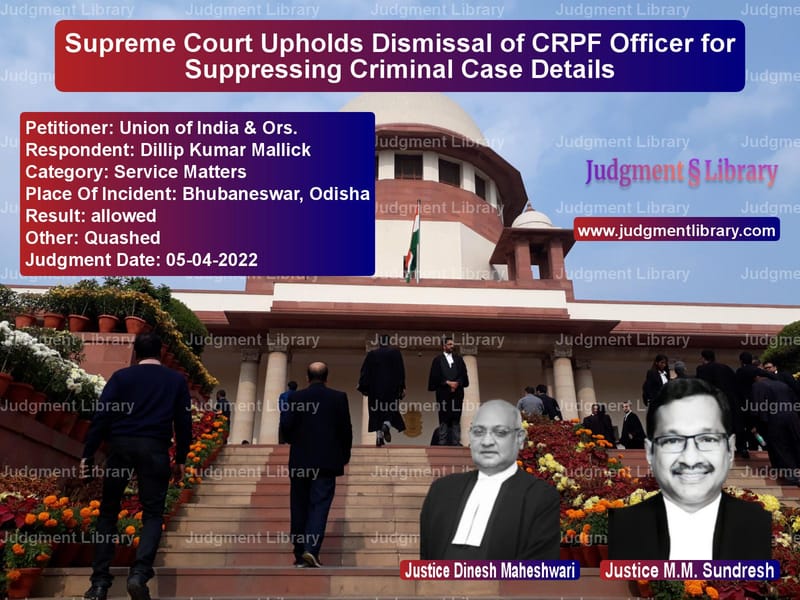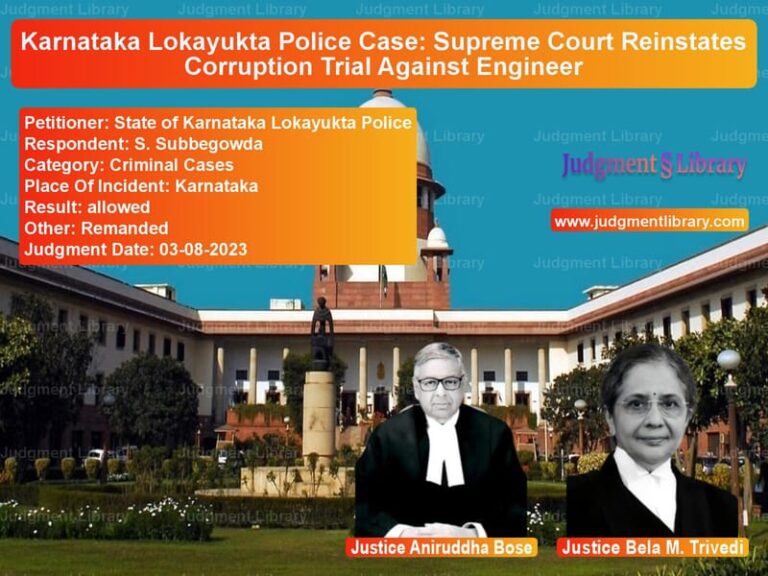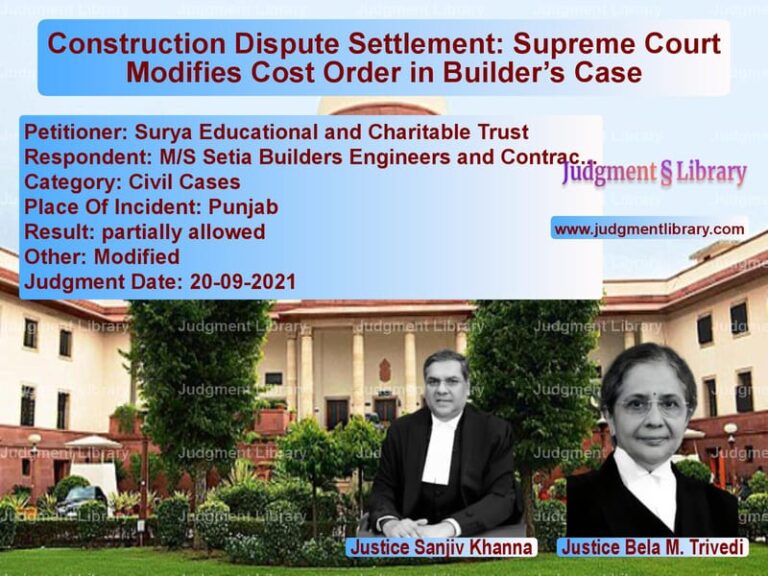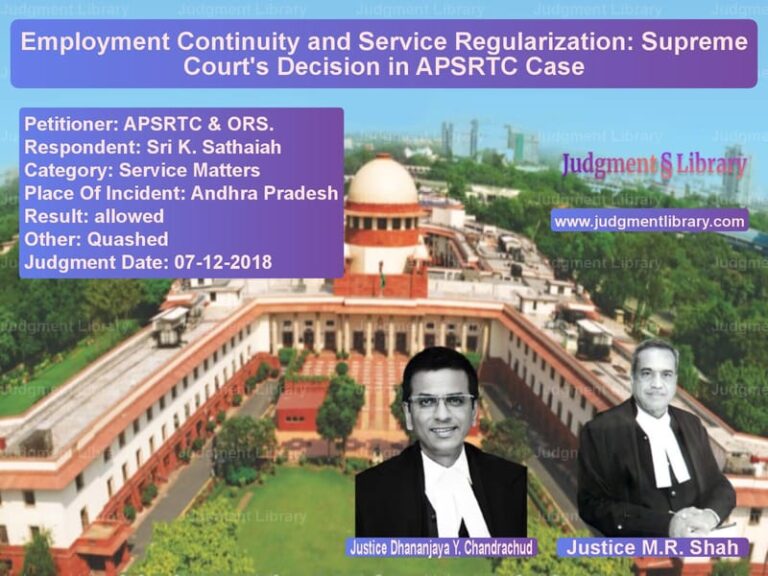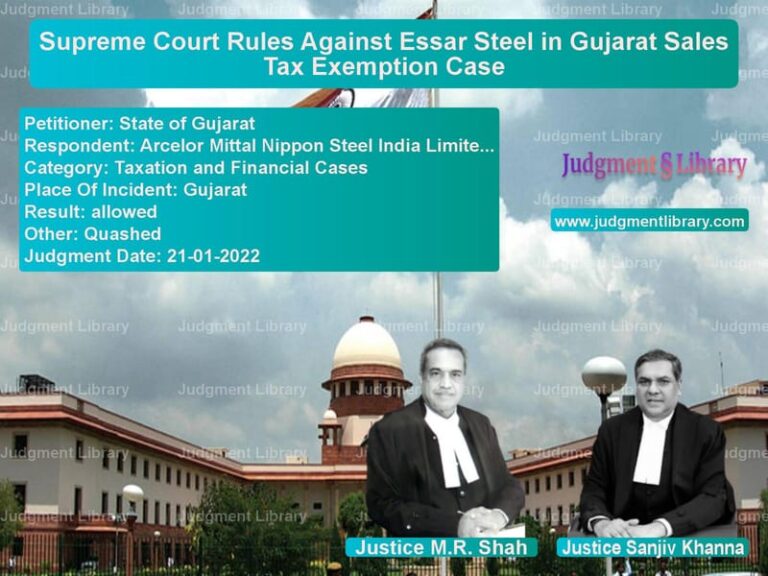Supreme Court Upholds Dismissal of CRPF Officer for Suppressing Criminal Case Details
The Supreme Court of India, in the case of Union of India & Ors. vs. Dillip Kumar Mallick, upheld the dismissal of a Central Reserve Police Force (CRPF) officer who failed to disclose a pending criminal case in his verification form at the time of recruitment. This judgment reaffirms the importance of transparency in government recruitment and emphasizes the legal consequences of withholding material information.
Background of the Case
Dillip Kumar Mallick was appointed in 2003 under the CRPF Group Centre, Bhubaneswar. During his service, a departmental inquiry was initiated against him based on allegations that he had failed to disclose a pending criminal case in his verification roll at the time of recruitment.
Mallick had been named in Kendrapara Police Station Case No. 349 dated 26.09.2001, under Sections 341, 323, 294, 337, and 506 read with Section 34 of the Indian Penal Code (IPC). He was charge-sheeted for these offenses on 01.12.2001, and the case was still pending at the time of his recruitment.
Read also: https://judgmentlibrary.com/larsgess-scheme-and-employment-rights-supreme-courts-final-verdict/
Disciplinary Proceedings and Initial Dismissal
The disciplinary inquiry found Mallick guilty of concealment of material information, and he was removed from service. His appeal against this decision was dismissed by the Appellate Authority on 31.07.2009.
Mallick then approached the Orissa High Court through Writ Petition No. 14945 of 2009, which directed the Appellate Authority to reconsider the case in light of the Supreme Court judgment in Commissioner of Police & Ors. v. Sandeep Kumar (2011). However, upon reconsideration, the Appellate Authority again upheld his removal from service on 22.08.2012.
High Court’s Partial Relief
Mallick filed another writ petition (W.P.(C) No. 24085 of 2012), which was dismissed by the Single Judge. He then filed an intra-court appeal before the Division Bench of the Orissa High Court, which partially allowed his appeal on 25.03.2019. While affirming his guilt, the High Court held that the punishment of dismissal was too harsh and directed the authorities to impose a lesser punishment and reinstate him in service.
Supreme Court’s Observations
1. Suppression of Criminal Case as Misconduct
The Supreme Court held that failing to disclose the pending criminal case amounted to suppression of material information, which was sufficient ground for dismissal.
“A person entering into public service is expected to be truthful. Any suppression of criminal antecedents, irrespective of whether the offense is serious or trivial, is misconduct.”
2. Application of the Avtar Singh Judgment
The Supreme Court referred to its previous ruling in Avtar Singh v. Union of India (2016), where it laid down guidelines for dealing with suppression of criminal cases in government recruitment:
- Information about conviction, acquittal, or arrest must be truthfully disclosed.
- The nature of the offense must be considered while determining the penalty.
- In cases involving moral turpitude, suppression of facts justifies termination of service.
3. Employer’s Discretion in Disciplinary Action
The Court emphasized that it is within the discretion of the employer to determine the penalty for misconduct. It ruled that the High Court erred in directing the imposition of a lesser punishment:
“Judicial review of punishment should be limited. Unless the penalty imposed is disproportionate to the offense, courts should not interfere.”
4. Importance of Disclosure in Public Service
The judgment reinforced that government employees must maintain high ethical standards. The Court held:
“Public employment requires transparency. Suppression of criminal proceedings, irrespective of their outcome, affects the integrity of the recruitment process.”
Final Judgment
- The Supreme Court set aside the Orissa High Court’s directive for imposing a lesser punishment.
- It upheld the CRPF’s decision to remove Dillip Kumar Mallick from service.
- The Court reiterated that suppression of a criminal case during recruitment is a serious offense.
Implications of the Judgment
This ruling establishes an important precedent for cases involving suppression of criminal records in government recruitment. Key takeaways include:
- Strict adherence to verification procedures in public employment.
- Upholding employer discretion in disciplinary actions.
- Setting a higher ethical standard for public servants.
Conclusion
The Supreme Court’s ruling in Union of India vs. Dillip Kumar Mallick reinforces the importance of integrity in government recruitment. It underscores that suppression of criminal history, even if the case eventually leads to acquittal, can have serious consequences. By upholding Mallick’s dismissal, the Court has reaffirmed the principle that public servants must be held to the highest standards of honesty and transparency.
Petitioner Name: Union of India & Ors..Respondent Name: Dillip Kumar Mallick.Judgment By: Justice Dinesh Maheshwari, Justice M.M. Sundresh.Place Of Incident: Bhubaneswar, Odisha.Judgment Date: 05-04-2022.
Don’t miss out on the full details! Download the complete judgment in PDF format below and gain valuable insights instantly!
Download Judgment: union-of-india-&-ors-vs-dillip-kumar-mallick-supreme-court-of-india-judgment-dated-05-04-2022.pdf
Directly Download Judgment: Directly download this Judgment
See all petitions in Disciplinary Proceedings
See all petitions in Termination Cases
See all petitions in Public Sector Employees
See all petitions in Employment Disputes
See all petitions in Judgment by Dinesh Maheshwari
See all petitions in Judgment by M.M. Sundresh
See all petitions in allowed
See all petitions in Quashed
See all petitions in supreme court of India judgments April 2022
See all petitions in 2022 judgments
See all posts in Service Matters Category
See all allowed petitions in Service Matters Category
See all Dismissed petitions in Service Matters Category
See all partially allowed petitions in Service Matters Category

